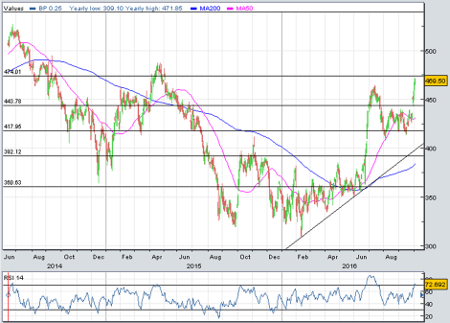How BP can narrow the valuation gap
5th October 2016 14:49
by Harriet Mann from interactive investor
Share on
Less than three months ago, Barclays upgraded its price target for to 600p. The broker still thinks the shares are worth that money, but a lot has happened since then to cloud the investment picture.
BP currently trades on 10.8 times Barclays' earnings per share (EPS) estimates for 2017, a discount to on 12 times. The prospective dividend yield is broadly comparable at 6.5% and 6.8% respectively.
"Although we see a clear valuation argument for owning BP shares, we do recognise that valuation alone has rarely proved enough for individual companies in the oil sector to outperform, with the stocks having the ability to remain cheap for long periods of time," writes analyst Lydia Rainforth.
"Yet the coming 18 months for BP should see the results of a multi-year improvement programme, making a meaningful difference to the bottom line without the drag of both elevated Macondo-related payments and restructuring charges that remain over the course of 2016."
Rainforth repeats her 'overweight' rating on the oil major, arguing that four key messages from BP's field trip to Azerbaijan in June have been overlooked: imminent production growth, better margins, better efficiency, and an ability to grow the portfolio without an acquisition.
Rainforth still thinks BP should be trading 28% higher at 600p, not seen since Deepwater HorizonOil prices are now expected to trade above $50 a barrel (/bl) in 2017 following OPEC's shock agreement to some level of production cut for the first time in eight years.
BP's share price has surged 9% since the news, filling the gap left after BP's double-digit summer slide.
Trading at an intra-day high of 470p, Rainforth still thinks the shares should be trading 28% higher at the 600p not seen since the Deepwater Horizon oil disaster in 2010 - that cost BP an eye-watering $61.6 billion (£46 billion).
Chief executive Bob Dudley has been adamant he would "rebalance the financial framework" to sustain the dividend he increased just before the industry collapsed. It's been controversial, but efficiency has improved - cash costs have fallen by $5.6 billion over the last year.
Rainforth reckons the reduction in capex and planned project start-ups will also help cover future dividends from organic cash flow with oil prices at $50-55 a barrel in 2017, just a tad higher than where they are now.

With a simpler portfolio and more efficient operations across both its upstream - exploration and production - and downstream - refining and marketing - businesses, BP's production and cash flow should surge.
It wants to add 800,000 barrels of oil (kboe/d) to 2015's daily production by 2020, with 500kboe/d of capacity available in just 15 months' time. Watch out for its North Sea projects Quad 204 and Clair Ridge in the first half of 2017 and the Khazzan project in Oman.
Not only will these growth and other projects increase production, but they'll also be more profitable. Expect operating cash margins 35% better than the current portfolio. In a $50/bl world, this should increase cash flow by $4.5-5 billion, with total pre-tax cash flow estimated to be around $7-8 billion.
Despite the widely-held belief to the contrary, BP also has enough options for growth past 2020 "without the need for a big acquisition", upstream chief executive Bernard Looney said at the field trip. What constitutes as "big" is clearly up for debate, but this should ease some concerns.
"This improving financial and operational performance comes at a point when the share price is offering a yield of 6.5% and over 30% potential upside to our 600p per share price target," says Rainforth.
"As such we see a material opportunity for the share price to continue to rerate. BP is our Top Pick in the sector and we rate the stock 'overweight'."
This article is for information and discussion purposes only and does not form a recommendation to invest or otherwise. The value of an investment may fall. The investments referred to in this article may not be suitable for all investors, and if in doubt, an investor should seek advice from a qualified investment adviser.